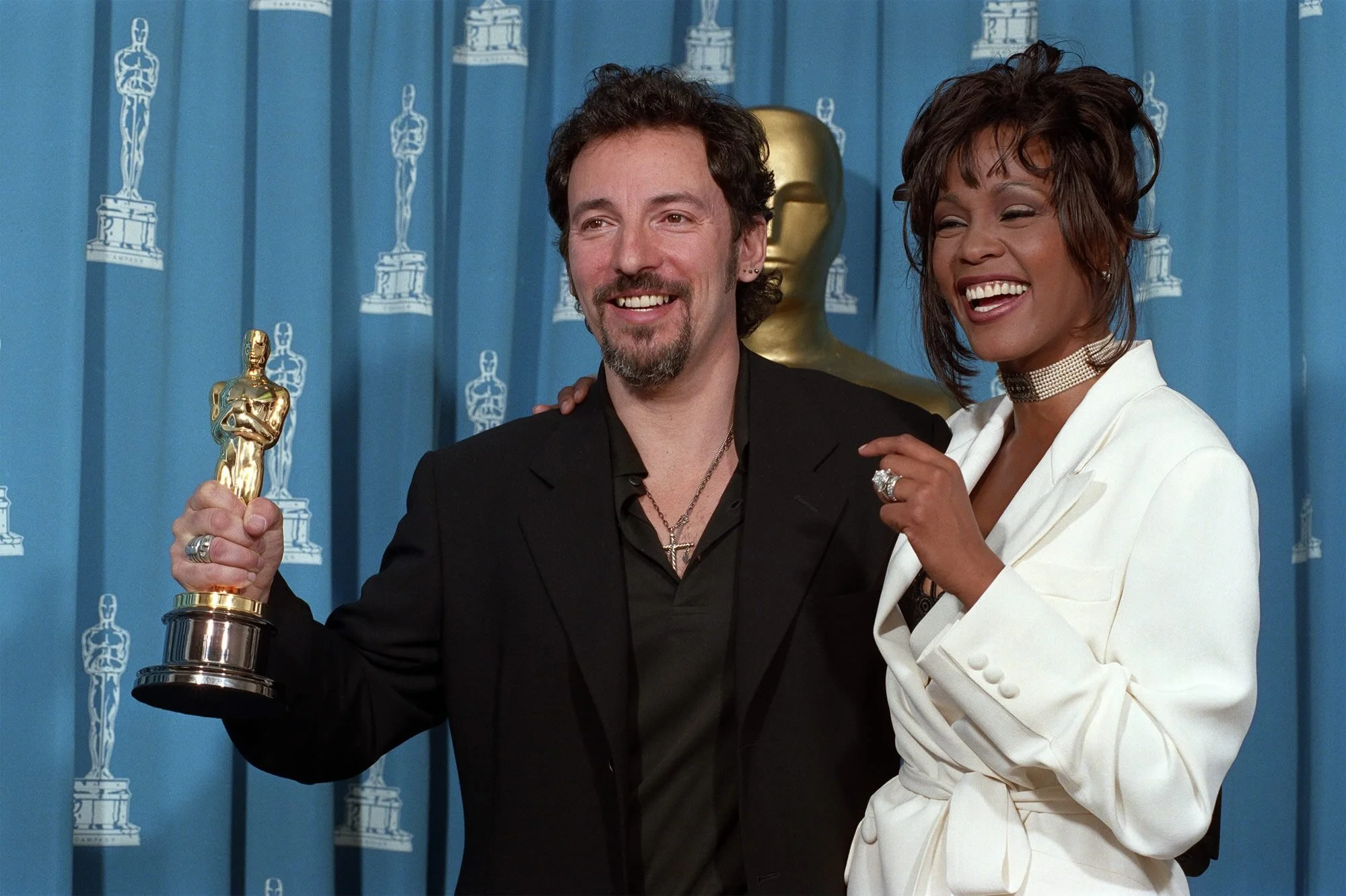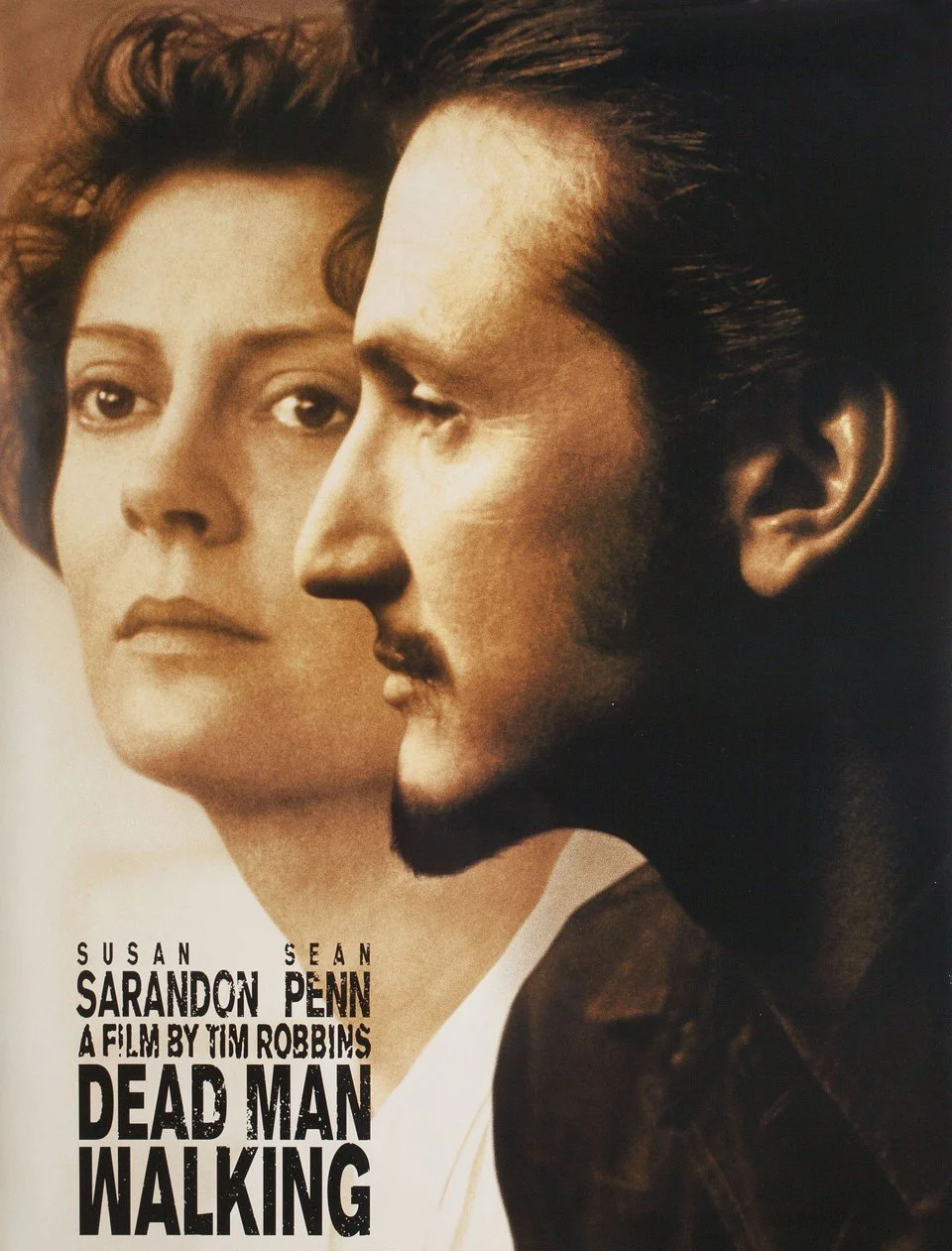From Streets of Philadelphia to Addicted to Romance: Ranking Every Bruce Springsteen Movie Soundtrack Song
Bruce Springsteen, holding the Oscar he won for “Streets of Philadelphia” with Whitney Houston
Springsteen: Deliver Me from Nowhere, featuring Jeremy Allen White playing Bruce Springsteen at an emotional and artistic crossroads in his career, finally hits theatres nationwide on October 24th and Searchlight Pictures is prepping for it to be one of their biggest hits of the year. Normally, a smaller-scale biopic focusing on an artist’s quieter, acoustic work over their rock anthems would be for limited markets, but the star power of White plus the success of music biopics in the last decade is giving Disney faith that audiences will come out in droves to see their new film.
But even beyond all that, there’s no denying that Bruce Springsteen himself is a major draw to audiences. For the last three decades or more, various films have used him as an integral part of their soundtracks, using his poetry and catchy melodies to underline a whole range of emotions from “Secret Garden” in Jerry Maguire to “The Fuse” in 25th Hour. But while hundreds of movies have used Springsteen’s existing catalog to add extra power to their soundtrack, only a select few have had an original song (or cover) recorded for their soundtrack. We took a close listen to the ten songs Springsteen made for these films below and ranked them in order from worst to best, but if we missed anything or you have a different ranking on your list, let us know on Facebook or Instagram!
10. “Freedom Cadence,” Thank You for Your Service
The one song on this list that has never seen an official release also has one of the most fascinating origin stories. Thank You for Your Service was a 2017 film about returning soldiers struggling with PTSD, based on the real-life accounts of Staff Sergeant Adam Schumann. “Freedom Cadence” is the name of the cadence that Schumann sang with his fellow soldiers in bootcamp, and producer Jon Kilik played a phone recording of it to his friend, Bruce Springsteen. Springsteen liked the track and arranged it for pump organ and banjo, singing the cadence in his gruff, mature voice. It’s a bit meandering compared to other songs on the list, but very powerful and moody.
9. “Addicted to Romance,” She Came to Me
“Addicted to Romance” is a bit of an outlier in Bruce Springsteen’s catalog - a sweet, low-key love song that doesn’t feature the usual melancholy or longing so many of his love songs do. Springsteen’s regular music partner of the last 15 years, Ron Aniello, assists in the production of the track, but the vibe of the song is much closer to the work of co-producer and member of indie rock band The National, Bryce Dessner. Dessner wrote the music for Rebecca Miller’s sweet 2023 romance film She Came To Me, and Springsteen’s song fits the mood of the rest of the score like a glove.
8. “I’ll Stand By You,” Blinded by the Light
Long before Gurinder Chadha’s charming 2019 film about a Bruce Springsteen super-fan using his music to find his own voice and identity, Springsteen wrote the song “I’ll Stand By You” for 2001’s Harry Potter and the Sorcerer’s Stone. When Rowling decided that she didn’t want any pop or rock music in the film, the song stayed on the shelf for years until Springsteen offered it to Chadha for her film. It’s a cute and catchy melody, strong enough that Bruce brought it back for his Twilight Hours album on his Tracks II boxset, although it’s clear that it was not originally intended for Blinded by the Light as it doesn’t share much in common with much of his other songs that drive the narrative of that film.
7. “Lift Me Up,” Limbo
The 90s saw Bruce Springsteen experimenting with all kinds of musical techniques most fans would think antithetical to his classic Jersey Shore sound: Drum loops, more reliance on droning organs and synths, and testing out the range of his voice. “Lift Me Up,” written for the end credits of John Sayles’s 1999 film Limbo, has Springsteen singing entirely in a falsetto - the first time he had ever sung exclusively in that range. The results have garnered mixed reactions over the years from fans, but his voice combined with the ethereal instrumental (with all parts performed by Bruce himself) evoke a very specific, moody feel that’s rare in his discography.
6. “Rhinestone Cowboy,” Western Stars
For someone known for such animated, energetic live shows, it’s astonishing that Bruce Springsteen has never released a theatrical concert film with his famous E Street Band. Nearly all his contemporaries (at least those who have achieved his level of fame) have had their concerts brought to the big screen, but the closest Bruce got to that was 2019’s Western Stars, a feature-length performance of his then most recent album. Western Stars, the album, was a lush, orchestral pop record with western and country influences, and he knew that performing the songs live on a tour with an orchestra would be unfeasible, so he recorded this intimate concert with a 20-piece orchestra and distributed the film to theaters. However, the album ends with the sweet, melancholic “Moonlight Motel,” a beautiful song that nonetheless would be a quiet note to send audiences home with. So, as an encore, Springsteen whips out a raucous cover of Glen Campbell’s “Rhinestone Cowboy,” blending in perfectly with the previous 13 songs and sending audiences away with a big smile.
5. “Missing,” The Crossing Guard
Bruce Springsteen’s music is baked into the DNA of Sean Penn’s directorial filmography. His first film, The Indian Runner, is based on Springsteen’s “Highway Patrolman,” a track from his legendary album Nebraska. For his follow-up film, The Crossing Guard, Penn reached out to Springsteen directly and asked if he could contribute a new track to his film. However, unlike the sparse acoustics of Nebraska, Springsteen had currently been working on an album (that was eventually shelved) combining drum loops and swirling, droning guitar textures. The track Springsteen contributed to the film, “Missing,” was the only preview fans would hear of his work around this era for 30 years - an atmospheric, dense track about loneliness and the end of a relationship.
4. “Dead Man Walkin’” Dead Man Walking
Two years after winning the Oscar for “Streets of Philadelphia” (see below), Springsteen returned to the Oscar stage with his new song, “Dead Man Walkin’,” from the Tim Robbins film of the same name. The song doesn’t necessarily follow that film’s plot directly, but both center on a man on death row and his reflections as he faces execution. While the film mostly focuses on the relationship between a nun (played by Susan Sarandon) and the accused looking for one last appeal, Springsteen’s character maintains no such innocence. Instead, he sings from the POV of a man facing death and the well of emotions that would arise in such a dire situation. Unlike “Streets,” Springsteen lost the Oscar to “Colors of the Wind,” the hit song from Disney’s Pocahontas, arguably a much less heavy track.
3. “Light of Day,” Light of Day
The most rollicking, out-and-out rocker Bruce Springsteen ever made for a movie does not even feature Bruce Springsteen in the final song. Instead, “Light of Day” is sung by the in-universe band The Barbusters, led by Joan Jett in a rare dramatic role. Despite only contributing the song but not vocals, this song has remained a favorite of Bruce fans for years and he’s played it live in concert multiple times, frequently using it as the big finale for his live shows in the 80s and 90s. While “Light of Day” is a great song in and of itself, what’s even more interesting is that Bruce was originally offered to compose a song for the film when it was still in pre-production under the title “Born in the USA.” The song Bruce wrote for that title inspired him so much that he ended up releasing it on his own and offering to write “Light of Day” for writer/director Paul Schrader instead.
2. “The Wrestler,” The Wrestler
Ever since writing about characters like Crazy Janey and Wild Billy on his first album, Bruce Springsteen’s character work has always been an integral part of his lyricism. On some of the other songs from this list, such as “Dead Man Walkin’” or our number-one song below, he’s able to draw such vivid portraits of fictional characters through symbolism and powerful choice of words. “The Wrestler” is more sparse than any of those. The barren lyrics simply present a number of images to the listener - a one-legged dog, a one-eyed man, a scarecrow filled with dust - and tells the listener that if they’ve seen these things before, then they’ve seen the narrator. It’s a powerfully simple structure, with a heartbreaking bridge where the character confesses that he drives away those people and places who provide him love and comfort. Even though the song was only written for Darren Aronofsky’s 2008 drama The Wrestler, it ranks up there as one of the masterpieces of Bruce’s late-period career, and likely would have taken home the Oscar if it hadn’t come out the year Slumdog Millionaire dominated the show.
1. “Streets of Philadelphia,” Philadelphia
Springsteen was initially wary when Jonathan Demme (fresh off his triumph of The Silence of the Lambs) approached him to write a song for his new movie, Philadelphia. Long before nearly all the other songs on this list were written, Springsteen agreed to give the writing a shot with the caveat that “I’m not very good at scores.” However, the track he wrote for the film, “Streets of Philadelphia,” ended up becoming one of the most powerful songs of his storied career. It’s not directly about the film, nor is it overtly about the AIDS epidemic or the LGBTQ+ experience (although some images in the second verse could be seen as references to this). Instead, he issues a direct emotional appeal from the POV of somebody who’s been forgotten by society and left to die alone in the gutter. It’s one of his bleakest songs, without a doubt, but it ends with an appeal to the listener: Are we as a society going to let people like this waste away into nothingness or will we be able to help them? This deep outpouring of emotion resulted in Bruce’s most successful song in years, including multiple Grammys and the Oscar for Best Original Song.











